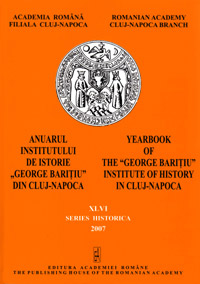Între voinţa comunităţii şi decizia episcopală. Instituirea preoţilor năsăudeni în a doua jumătate a secolului al XIX-lea
Between Community Will and the Bishop's Decision. The Priest Institution in Năsăud in the Second Half of the 19th Century
Author(s): Mirela Popa-AndreiSubject(s): History
Published by: Editura Academiei Române
Keywords: Transylvania; Nasaud; Community; Bishops; Greek Catholic Church
Summary/Abstract: The parishes belonging to the Vicarage of Rodna have sketched over time their own religious identity. This was legitimate in the filiation established with the tradition of Făgăra? Episcopate, regarded as the only preserver of the "uncontaminated" specificity of Romanian Greek Catholic Church and within the specificity of communities concerned, that of frontier, free villages. One of the defining elements of what we have called Năsăud religious identity consisted of the involvement of religious communes in Rodna valley in the procedure of appointing priests, by using their right to select them. The various situations investigated in that time reveal that in most cases the villages in the Vicarage of Năsăud were in fact making the first selection of candidates. Therefore, they had a right that, during the neo-absolutist and liberal period, the episcopacy admitted, observing it almost unconditionally. But with the increasing demands regarding the aspirants for a position of parish and following the rights granted to bishops by the Concordat of 1855, the diocesan bodies of Gherla were more and more evidently involved in the process of appointing priests, in the sense of imposing their own candidate without consulting the will of village communities. The episcopal bodies have increasingly appealed to the new practice, especially in the 70s of the XIX-th century. In the vison of Năsăud communes, this infringed on the one hand the prerogatives of the foraneous vicar, and on the other hand it ignored their former right of choice. The struggle for observing the ancient Năsăud right has grown during some bishops with Latinist views (Mihail Pavel, Ioan Szabó), manifesting as a reply to the type of diocesan policy that they practiced. In the vicarage of Rodna, one of the most tense episodes in the struggle for primacy in appointing the priest between the episcopacy and the communities took place in the first half of 1874. The incident reported the perspective of separating the parishes from the episcopacy as this, by the attitude it displayed proved to be foreign to the deep desires, to the habits deeply rooted in the collective - religious consciousness of communities in its area of administrative and spiritual government. Eventually the conflict was resolved, but in the future, although the episcopacy did not formally recognize Năsăud parishes the right of choice, most of the time it took into account their proposals and preferences for a particular candidate. This meant the "de facto" perpetuation in Năsăud land of the right of the church community to choose its priest.
Journal: Anuarul Institutului de Istorie »George Bariţiu« - Series HISTORICA
- Issue Year: XLVI/2007
- Issue No: 46
- Page Range: 207-222
- Page Count: 16
- Language: Romanian

